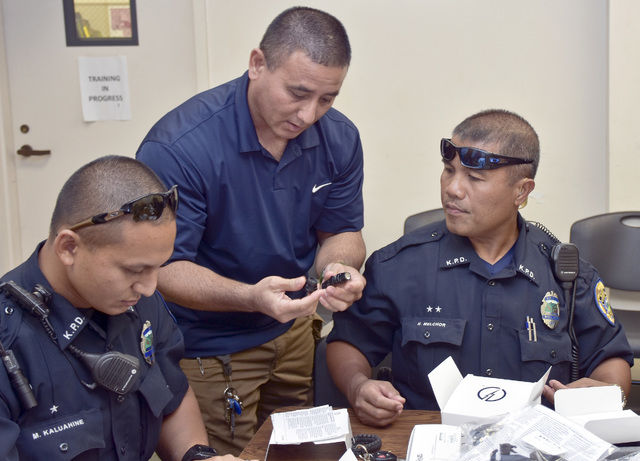HONOLULU — The State of Hawaii Organization of Police Officers said it will appeal a ruling by the Hawaii Labor Relations Board that Kauai police did not need the union’s approval prior to implementing body-worn cameras. “We have always been
HONOLULU — The State of Hawaii Organization of Police Officers said it will appeal a ruling by the Hawaii Labor Relations Board that Kauai police did not need the union’s approval prior to implementing body-worn cameras.
“We have always been in support of the cameras,” SHOPO President Tenari Maafala told The Garden Island Thursday. “But this is a matter of protecting and preserving the language of our contract. We will be appealing the decision.”
In January, SHOPO filed a prohibited practice complaint against the Kauai Police Department alleging that body-worn cameras were a matter of work conditions and subject to collective bargaining.
SHOPO’s complaint states the body-worn cameras program would fall under “mutual consent,” which dictates salary, wages and work conditions. But KPD argued the cameras fell under “meet and confer.”
After months of litigation, the HLRB ruled in favor of KPD. It stated it didn’t need approval by the union to implement body-worn cameras.
“KPD and SHOPO agree, as we always have, that body-worn cameras are an important technological benefit both to the police department and our community,” said KPD Chief Darryl Perry on Thursday. “As KPD is the first police department in the state to implement a body-worn camera program, we understand that means we will hit speed bumps along the way but we’re not deterred because we believe in what we’re doing.”
He said he looked forward to collaborating with SHOPO “on this and other matters that are important to our communities, police departments, and officers.”
“We’re not disappointed (with the decision), but we are taken aback,” Maafala said. “It’s not just a matter of a policy. We were a part of fashioning the policy. We wanted to preserve the policy.”
Maafala argues that KPD general order 41.17, which polices how officers can use the cameras, defines disciplinary actions for officers who don’t follow the policy.
“If you’re going to have officers mandated to use technology, then it falls under work conditions,” Maafala said.
In its ruling, HLRB said body-worn cameras are “no different than a police officer’s weapon, hand-held radios, Tasers with built-in cameras, in-car dashboard cameras, baton and uniforms.”
These items duties are used by officers in their day-to-day, the HLRB said.
“SHOPO, when KPD adopted its ruled and polices regarding the use of these items of equipment, never argued that the ‘mutal consent’ requirement applied,” HLRB said in its ruling.
KPD has been using body-worn cameras since their rollout in December. Perry has maintained that it is for the benefit of the department and the protection of his officers.


